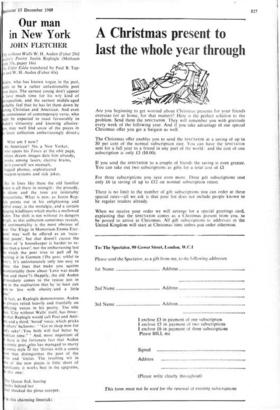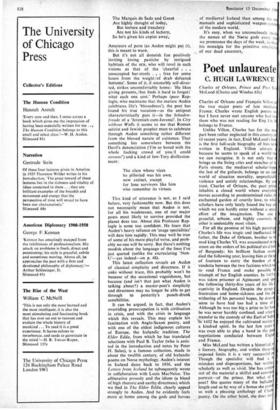Our man in New York
JOHN FLETCHER
,r). without Walls W. H. Auden (Faber 200 {;den's Poetry Justin Replogle (Methuen ,Ith 35s, paper 16s) y Elder Edda translated by Paul B. Tay- and W. H. Auden (Faber 40s) ;den, who has known vogue in the past, ,:rns to be a rather unfashionable poet ,.se days. The earnest young don't appear have much time for his wry kind of rospection, and the earnest middle-aged obably feel that he has let them down by ,.-ning Christian and American. And even e connoisseur of contemporary verse, who fight be expected to react favourably to uden's virtuosity and knowing allusive- ess, may well find some of the pieces in s latest collection embarrassingly direct:I
Who am I now?
An American? No, a New Yorker, who opens his Times at the obit page, whose dream images date him already, awake among lasers, electric brains, do-it-yourself sex manuals, bugged phones, sophisticated weapon-systems and sick jokes.
But in lines like these the old familiar uden is all there in strength: the prosody, e idiom and the tone are inimitably aracteristic. What is new, as Justin Rep- gle points out in his enlightening and pful essay, is the nostalgia, and a certain gaging kindliness which marks a mellowed uden. The shift is not without its dangers ough, as this collection sometimes reveals,
d sentimentality is the most obvious of ese. The 'Elegy in Memoriam Emma Eier- ann' may well be offered as an 'occa- nal poem', but that doesn't excuse the yness of 'a housekeeper is harder/to re- ce than a lover', nor the embarrassing last
e which the poet tries to pull off by uching it in German ('Du gate, schlaf in hi). It's unfortunately only too easy to Dory the lines that make you squirm comfortably (how about 'Love was made en and there'?) Happily, the old Auden f-mockery comes to the rescue just in e in the realisation that he 'at least can rn to live with obesity/and a little
In fact, as Replogle demonstrates, Auden s always relied heavily and fruitfully on nflicting voices in his poetry. The title ce, 'City without Walls' itself, has three: 0 that Replogle would call Poet and Anti- t, and a third, 'bored' voice, which pricks e others' balloons: "Go to sleep now for d's sake! /You You both will feel better by eakfast time." ' And, most important of , there is the fortunate fact that Auden a comic poet,rho has managed to marry Comic style of the 'thirties with .a comic on that distinguishes the poet of the ties and 'sixties. The resulting wit in e of the new pieces is little short of gnificent; it works best in the epigrams, e this one:
e Queen fled, leaving oks behind her t shocked the pious usurper.
la this charming limerick:
The Marquis de Sade and Genet Are highly thought of today,
But torture and treachery Are not his kinds of lechery, So he's given his copies away= Amateurs of porn (as Auden might put it), this is meant to warn.
But it's not all donnish fun positively inviting loving pastiche by intrigued habitués of the SCR, who will revel in such visions as that of the 'cheerful .
unoccupied bar-stools . free for some hours from the weight/of drab defeated bottoms'. Some of it, if ostensibly self-direc- ted, strikes uncomfortably home: 'He likes giving presents,/ but finds it hard to forget/ what each one cost.' Perhaps (pace Rep- logle, who maintains that the mature Auden celebrates life's 'blessedness'), the poet has found his true vocation—as the antipoet characteristically puts it—in the Schaden- freude of a 'Jeremiah-cum-Juvenal'. In City without Walls it seems to me that Roman satirist and Jewish prophet meet to celebrate through Auden something rather different from the blessed nature of existence. That something lies somewhere between the Devil's denunciation ('I'm so bored with the whole fucking crowd of you/I could scream!') and a kind of low-Tory disillusion- ment: The class whose vices he pilloried was his own, now extinct, except for lone survivors like him who remember its virtues.
This kind of utterance is not, as I said before, very fashionable now. But this does not necessarily mean that Auden is not, for all his weaknesses, one of our major poets most likely to survive provided the planet does too. About this Professor Rep- logle is none too confident. He fears that Auden's heavy reliance on 'usage specialities' will date him rapidly. This may well be true of some of his more playful verse, and prob- ably no one will be sorry. But there's nothing modish about the language of the lines I've just quoted (unlike the excruciating 'Non- U'—yes indeed—on p. 48).
This latest collection reveals an Auden of classical simplicity and directness. If it sinks -without trace, this probably won't be because of the occasional voguishness, but because (and isn't that just what Auden is talking about?) a master-poet's simplicity and directness may no longer be able to get through to posterity's punch-drunk sensibilities.
It can be argued, in fact, that Auden's overriding preoccupation is with civilisation in crisis, and with the crisis in language which this reveals. This may explain his fascination with Anglo-Saxon poetry, and with one of the oldest indigenous cultures of Europe, the Icelandic tradition. The Elder Edda, from which he has translated selections with Paul B. Taylor (who is assis- ted in the introduction and notes by Peter H. Salus), is a famous collection, made in about the twelfth century, of old Icelandic poems on Norse mythology. Auden's interest in Iceland dates back to 1936, and the Letters from Iceland he subsequently wrote in collaboration with Louis MacNeice. The alliterative prosody and the idiom (a blend of high rhetoric and earthy directness), which we find in The Elder Edda, clearly appeal strongly to Auden. And he evidently feels more at home among the gods and heroes
of mediaeval Iceland than among the manuals and sophisticated weapon-syste of the modern world.
It's easy, when we unconsciously invo the names of the Norse gods every ti we pronounce the days of the week, to sha his nostalgia for the primitive simplicit of our dead ancestors.,















































 Previous page
Previous page